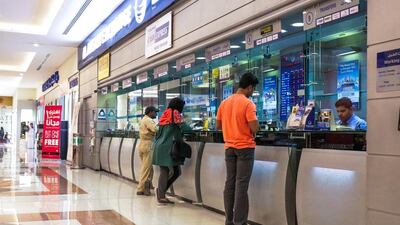Remittances are frequently seen as a massive drain on Arabian Gulf economies. Analysts applauding Saudi Arabia's recent decision to lift a ban on women drivers predicted that decreasing demand for foreign drivers would save the economy millions of dollars in remittances. Policymakers around the region regularly consider a tax on foreign remittances in an explicit effort to boost the local economy. But are concerns about remittances well-founded?
To answer this question, we need to understand the principles of commercial exchange. We begin by noting that the worst possible condition for a human household is absolute self-sufficiency. If your family had to hunt and gather its own food, manufacture its own clothes, build its own shelter, and so on, the quality of output would be woeful compared to what you can procure from the market. The reason is simple: trade allows for specialization, which in turn brings efficiency gains, for two reasons.
First, specialisation allows people to focus on producing goods in which they have a comparative advantage, and outsource those they are relatively weak in delivering.
Second, specialisation allows the exploitation of economics of scale, such as mass production techniques, which are unavailable at the small production levels that households are forced to produce at in the event of self-sufficiency.
_______________
Read more:
Economics 101: Inter-cultural ties are key building blocks for international business
Economics 101: Terrorism rarely destroys tourism for good
Economics 101: Why did Mayweather earn so much more than McGregor?
_______________
The same principles apply at the international level; just as household specialisation contributes to higher living standards, so too does country-level specialisation. Forcing Japan to rely on its own energy sources, or Saudi Arabia to rely on its own car manufacturing, would be disastrous for the well-being of citizens of both countries. Generally speaking, the more that a country imports and exports, the better its economy performs, as the greater its ability to reap the benefits of specialisation. Commercial trade is unquestionably the most important reason for global economic growth since antiquity.
So how does this relate to remittances?
Remittances are, loosely speaking, the "price" of importing labour. The small populations and young educational systems of the countries in the Gulf create a demand for foreign labour, which is paid for largely by hydrocarbon exports. Remittances are a manifestation of the desire to specialise, and therefore, at first sight, they enhance the economy. Without the remittances that western experts working in Aramco send to their families, the oil output of Saudi Arabia would be significantly lower, constituting a significant blow to the economy. So why do main in the Gulf look at such remittances so negatively?
The complicated economics of commercial trade can be hard to understand; throughout the world, there's often a backlash against international trade and foreign workers and companies during times of economic recession, with Gulf countries no exception.
Such principles however apply to foreign goods as well as foreign people. While some in the Gulf may grumble about foreign labour, few have such complaints against foreign goods like smartphones made by Apple and cars made by Toyota. What explains this apparent inconsistency?
Gulf citizens envisage two intermittently plausible alternatives to remittances. First, the foreigner spending their salary in the Gulf, rather than remitting it. Second, a citizen doing the work that that the foreigner performs. However, both are largely red herrings.
The reason why Gulf-based foreign workers remit so much of their earnings abroad is that there is almost no path to citizenship or permanent residency—they are guest workers. In contrast, a foreigner working in the UK or Sweden has a well-defined path to settling their entire family there permanently, giving them a much greater incentive to spend their earnings locally. Attempting to legally coerce foreigners in the Gulf to keep more of their money there—for example via a tax on remittances—will probably backfire, as it will force the wages of foreigners up, indirectly transferring the cost back to Gulf citizens.
As for Gulf citizens being able to perform the jobs performed by foreigners, in many cases—especially some of the high skill, high pay jobs—that is an illusion. The USA has some of the finest companies and universities in the world, and they are full of foreigners, because the USA has a comparative advantage in limited areas. The need for foreign help in the Gulf is even more acute. Insisting on exploiting our comparative advantage in hydrocarbons without foreign skills would be economic suicide.
In the context of jobs lower down in the corporate hierarchy, there are grounds for exasperation among Gulf citizens, since our comparative disadvantage in those jobs is—in many cases—artificially self-inflicted. Saudi Arabia needs so many drivers, not because Saudis are incapable of driving, but because it legally prevented half of them from driving. And the comparative disadvantage in many low-skilled jobs is the result of the government offering comfortable public sector jobs to citizens, pricing them out of more modest professions.
Reforms such as the Saudi Vision 2030 address these latter distortions: women will drive, and inefficient public sector jobs will be slashed. Moreover, plans to grant permanent residency will encourage further reductions in remittances. However, policymakers and economists in the Gulf should also do their part by helping to educate local populations on the benefits of foreign labour, and how the positive impact of remittances far outweighs the negatives.
Omar Al-Ubaydli is the program director for International and Geo-Political studies at Derasat, Bahrain. We welcome economics questions from our readers via email (omar@omar.ec) or tweet (@omareconomics).


